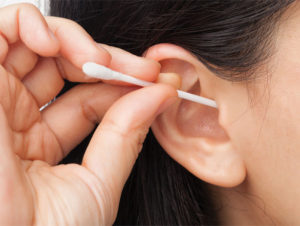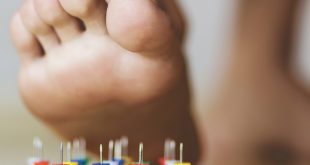By Michael Branch, MD
 Want to know what the tiniest, most fragile bones in the body are? The three bones commonly called the hammer, anvil and stirrup, or “malleus, incus & stapes” to use the formal names. These bones are in the middle ear which is the space behind the eardrum. When sound waves hit the ear drum, they are converted to mechanical waves. This causes these small bones to move in harmony with the frequencies of the original sound. With even the tiniest amount of pressure on the eardrum, these bones move and conduct the mechanical wave to the inner ear, or cochlea (the snail shaped bony part of the ear). With major trauma, these bones can fracture and cause significant problems with hearing.
Want to know what the tiniest, most fragile bones in the body are? The three bones commonly called the hammer, anvil and stirrup, or “malleus, incus & stapes” to use the formal names. These bones are in the middle ear which is the space behind the eardrum. When sound waves hit the ear drum, they are converted to mechanical waves. This causes these small bones to move in harmony with the frequencies of the original sound. With even the tiniest amount of pressure on the eardrum, these bones move and conduct the mechanical wave to the inner ear, or cochlea (the snail shaped bony part of the ear). With major trauma, these bones can fracture and cause significant problems with hearing.
What many people don’t realize is how close the eardrum is to the ear canal opening, so as the saying goes, “Anything smaller than your elbow, should not go in your ears!”
So, what about cleaning the ears?
Most people have heard that they should never put a cotton swab in their ears, but many do it anyway. The small cotton swab fits perfectly in the ear canal and even though one might get some wax out, many times it pushes wax further in. Over time, the wax can build up and become impacted. Up until the late 1970’s these popular swabs were marketed for cleaning the ears; but with this common hygienic practice there are significant risks.
There have been many mainstream stories over the years about the use of cotton swabs causing trauma to the ear canal and even holes in the eardrum or worse. In severe cases, the trauma can even damage the hearing bones. As an otologist, I have heard many stories over the years from patients coming in the office for bleeding of the ear and hearing loss. In one case, the patient forgot the swab was in the ear and jumped on the bed. Another was cleaning the ear and someone opened the door which hit his arm and pushed the swab in. Although most holes in the eardrum from such events will heal itself, some will not. Fortunately, there are surgeries for non-healing eardrum perforations and damage to the hearing bones.
Earwax serves a purpose
The wax in your ears is there by design. It acts as a protective barrier against infection. The wax is acidic and offers antimicrobial factors, but if it gets pushed down too far in the ear canal it can block up the ear which can lead to infection and hearing loss.
So how do we properly clean the ears?
The ear canals have a natural process to maintain a relatively healthy ear. When they function correctly earwax is continuously produced and then slowly liquefied assisted by things like chewing. Normally this slow process is automatic and simply leaving the ears alone is sufficient. Washing the ears out in the shower or with cleaning the external opening of the ear can help this natural process. But when the wax is too hard, it can get stuck and build up. This usually happens when the ear canals and wax are too dry. In other cases, it is too soft and it partially dissolves but builds up and blocks the ear canal. When too much earwax accumulates it can cause earaches, infections, hearing loss, and tinnitus.
The American Academy of Otolaryngology recommends the following methods for safely cleaning the ears by a professional:
• Soften the wax with a few drops of mineral oil, appropriate cerumenolytic, glycerin or hydrogen peroxide.
• Ear irrigation (but not jet irrigation) by primary care or ENT. Instrument removal or suction is best performed by an ENT doctor who has these tools.
If you’ve got water in your ears, you can externally dry the ear and use a hairdryer on low or apply 4-5 drops of rubbing alcohol into the ear to dry the water, provided you don’t have a hole in the ear drum or other chronic ear diseases, of course. Holistic ear candles are not recommended.
When wax blocks your ear and simple home remedies like gently washing the ear canals are insufficient, a primary care doctor can gently flush the ear canal, avoiding jet irrigations, or an ENT doctor can use special tools to remove it. If your ear is bleeding or starts to hurt or drain, it’s best to see an ENT for a proper exam and treatment.
Michael Branch, M.D.
Board Certified Otolaryngologist – Ear, Nose, and Throat
Dr. Branch was born in Jacksonville and raised in Gainesville, Fl. His first love was music, playing drums in various rock and roll bands in Gainesville in the 1960s–1970s. He enlisted in the USAF in 1973 and served active duty as an operating room technician for four years. He was commissioned in the USN in 1984 and, after completing residency in Otolaryngology in 1993, served three years active duty as an Otolaryngologist in the Naval Hospitals at Orlando and Pensacola. He has been in private practice since 1996. He is married with three adult children and three adult stepchildren. He has special interests in systematic and reformed theology. He enjoys playing, writing and recording music with his bandmates in Gainesville and loves fishing with his lovely wife, snorkeling and diving.
Florida Medical Clinic
813.778.0101
Wesley Chapel
Wiregrass Multi Specialty Campus
2352 Bruce B Downs Blvd., Suite 303
Wesley Chapel, FL 33544
Zephyrhills
Eiland Multi Specialty Campus
36763 Eiland Blvd., Suite 103
Zephyrhills, Florida 33542
Check Also
Revolutionizing Healthcare: Exploring Regenerative Medical Treatments at QC Kinetix
By Daniel Sucherman, MD In recent years, the field of regenerative medicine has emerged as …
 Central Florida Health and Wellness Magazine Health and Wellness Articles of the Villages
Central Florida Health and Wellness Magazine Health and Wellness Articles of the Villages


